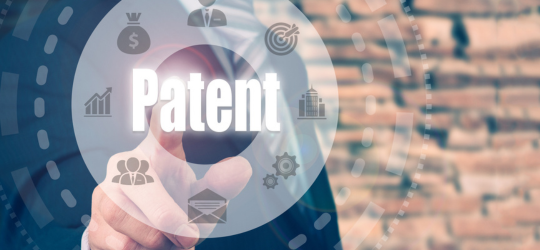Copyright Trademark and Patent Services
Our comprehensive legal services encompass Copyright, Trademark, and Patent matters. With our expertise in intellectual property law, we offer tailored solutions to protect and safeguard your creative works, brand identity, and innovative ideas. Whether it's ensuring the originality of your artistic creations, securing exclusive rights to your brand assets, or safeguarding your inventions, our dedicated legal team is committed to providing you with effective strategies and legal support in the realms of Copyright, Trademark, and Patent law.
Copyright Registration
Understanding Copyright
Copyright stands as an essential Intellectual Property Right safeguarded by the Copyright Act of 1957. This protection extends to the original creations of authors, encompassing literary, dramatic, musical, and artistic works as well as computer software and other digital media. Such protection prevents third-party use without explicit consent to use, distribute, reproduce, and display that work from the creator of an original work. To achieve Copyright Registration, a degree of uniqueness must be present within the author's work.
At IP & Legal Filing (IPLF), we offer a comprehensive suite of services for Copyright registration, ensuring our clients can fully capitalize on their intellectual property rights with minimal complexity.
Our proficient team excels in handling intricate matters including Copyright infringement, registration procedures, licensing, enforcement, and addressing objections. Furthermore, our experts assist clients in structuring a robust legal framework for licensing and franchising their copyrightable creations, while also helping you ensure vigilant enforcement of their rights.
What can be registered as a Copyright ?
A wide range of creative and original works can be registered as Copyright. The Copyright Act of 1957 in India offers protection to various categories of artistic, literary, and musical creations. Some examples of what can be registered as Copyright include:
This category covers books articles poems and other written materials
Paintings, drawings, sculptures, photographs, and other visual artworks fall under this category.
Original musical compositions and songs are eligible for Copyright protection.
Scripts, screenplays, plays, and choreography are considered dramatic works.
Entire films, including the audio-visual content, can be registered for Copyright.
Original recordings of sounds, including music or voice recordings, can be protected.
Software programs, codes, and applications are eligible for Copyright registration.
Original architectural designs and blueprints can be registered.
Translations of literary and artistic works are also protected.
New creations based on existing works, such as adaptations and abridged versions, are eligible.
What is the Process of Copyright Registration ?
It's important to note that the process might have variations depending on your country's copyright laws and procedures Consulting or seeking legal advice with Satori OCS can help ensure a smooth registration process.
Begin by preparing the copyright application form. This form collects essential details about the work, the creator, and the nature of the copyright sought.
Compile all necessary materials for submission, including copies of the work being registered, any supporting documents, and the application form.
Choose between online or offline filing based on the guidelines provided by the copyright office. Online filing usually involves creating an account on the copyright office's website and submitting the application and materials electronically.
Pay the required copyright registration fee. The fee may vary depending on factors like the type of work, the category under which it falls, and the method of filing.
Submit the application form, along with the necessary materials and fee payment. Once submitted, you will receive an acknowledgment receipt or a reference number.
The copyright office examines the application to ensure that it's complete and meets the necessary requirements. They may contact you for any clarifications or additional information.
If everything is in order, and your application is approved, the copyright office will issue a registration certificate. This certificate serves as evidence of your copyright ownership.
With the registration certificate in hand, you have legal proof of ownership, making it easier to enforce your copyright against any infringement.
Essential Details for Copyright Registration:
- Work Title
- Applicant's Name
- Applicant's Address
- Directors' Names (if applicable)
- Language of Work
- Publication Date (in India)
- Authorized Signatory (if applicable)
- Author's Name
Timeline

Trademark Registration
For the purpose of ensuring the submission of distinctive word-marks, logos, or punchlines for trademark registration, we specialize in performing in-depth research and evaluation. Through the trademark registration procedure, our committed approach ensures the protection and distinctiveness of your brand identity.
Understanding Trademark Registration
In India, the legal framework governing trademarks is outlined by The Trademarks Act, 1999, and the Trademarks Rules, 2002, subject to amendments. A trademark refers to a distinctive mark that can be visually represented and has the potential to distinguish one's goods and/or services from others. This encompassing definition extends to elements like packaging, and colour combinations.
A trademark is a symbol, word, phrase, logo, slogan, product name, or packaging design that identifies and distinguishes your goods or services from those of others and can help prevent others from using similar symbol, word, phrase, logo, slogan, product name, or packaging design that may confuse customers. Further requiring the categorization of products and services based on the international categorization system for trademark registration is Section 7 of the Trademark Act, 1999. This grouping includes products in classes 1 through 34 and services in classes 35 through 45.
Customers place a high value on trademarks because they help them quickly differentiate and recognize businesses, such as Nike's tick mark or Puma's leaping wildcat emblem. Since trademark registration doesn't have the definite time restriction that distinguishes patents, the protection it provides is everlasting. While patents expire after 20 years, trademark registrations endure for 10 years initially and can be renewed for successive 10-year periods. This perpetuity underscores the significance of trademark registration in safeguarding and preserving your brand's unique identity and value.
Trademarks can be registered with the appropriate government agency, such as the USPTO in the United States, and require a thorough search of existing trademarks and the submission of a trademark application.
Registering a trademark gives you the exclusive right to use that trademark in connection with your goods or services and prevents others from using it without your permission.
Trademark Registration Process
Conduct a comprehensive search to ensure your desired trademark is unique and doesn't conflict with existing trademarks. This helps avoid potential objections during the registration process.
Prepare the trademark application with accurate details, including the trademark's visual representation, the goods/services it represents, and the applicant's information.
Submit the application to the appropriate Trademark Office in India, either online or offline. Pay the necessary filing fees.
The trademark office examines the application for compliance with formalities and any potential conflicts. They might issue an examination report or an objection if there are concerns.
If there are no objections or the objections are resolved, the trademark is published in the Trademark Journal. This allows others to oppose the registration if they have valid reasons.
After publication, there's a specific time frame during which third parties can oppose the registration if they believe it conflicts with their existing rights.
If no opposition is raised or successfully resolved, and the trademark passes all requirements, the Trademark Office issues a Registration Certificate.
With the Registration Certificate, your trademark is protected for an initial period of 10 years. You can renew the registration indefinitely by filing renewal applications every 10 years.
The process may vary based on specific circumstances, objections, and other factors. Seeking legal guidance and expert assistance from Satori OCS can ensure a smoother trademark registration journey.
Essential Details for Trademark Registration
- Trademark/Logo for Registration
- Date of First Use or 'Proposed to be Used'
- Applicant's Name, Address, Nationality, and Details
- Goods/Services Description
- Correspondence Address with Contact Information
- Power of Authority
Timeline

Here are some reasons why you may want to consider registering your Trademarks and Copyrights:
- Protect your Brand
Trademarks and copyrights can help protect your brand identity products, and services from infringement misuse and counterfeiting.
- Enhance your Business Value
Registering your trademarks and copyrights can increase the value of your business and make it more attractive to investors and potential buyers.
- Legal Protection
Trademarks and copyrights provide legal protection against infringement and allow you to enforce your rights and take legal action against those who violate your intellectual property rights.
- Marketing Advantage
Registered trademarks can help you market your products and services and build brand recognition among consumers.
Protecting your trademarks and copyrights can help you maintain a competitive edge in the marketplace and ensure that your brand is associated with high-quality products and services.
Working with a legal expert in this area can help you navigate the registration process, determine the appropriate intellectual property protection strategy for your business and ensure that your trademarks and copyrights are properly protected.
Patent Registration
Patents are legal protections granted by governments to inventors or their assignees for a limited period of time, typically 20 years from the date of filing. Patents provide the inventor with the exclusive right to use, manufacture, and sell their invention, and to prevent others from using it without permission.
Here are some important things to know about patents
-
 Patentable Subject Matter
Patentable Subject Matter
Patents can be granted for any new and useful process, machine, manufacture, or composition of matter; or any new and useful improvement thereof. In general, patents cannot be granted for abstract ideas, natural phenomena, or laws of nature.
-
 Patent Requirements
Patent Requirements
To be granted a patent, the invention must be novel, non-obvious, and useful. In addition, the invention must be fully described in a written application, including detailed drawings and specifications.
-
 Patent Process
Patent Process
The patent process involves filing a patent application with the appropriate government agency, such as the United States Patent and Trademark Office (USPTO) in the United States. The application must include a detailed description of the invention, including drawings and specifications. The application is then examined by a patent examiner, who determines whether the invention meets the requirements for patentability.
-
 Patent Infringement
Patent Infringement
Patent infringement occurs when someone uses, manufactures, or sells a patented invention without permission from the patent holder. Patent holders can enforce their rights by filing a lawsuit against the infringing party, seeking damages and an injunction to prevent further infringement.
-
 Importance of Patents
Importance of Patents
Patents are important because they protect inventors' rights to their inventions, allowing them to profit from their ideas and investments in research and development. Patents also promote innovation by providing inventors with an incentive to create new and useful products and processes.
Patents are essential for protecting inventors' rights to their inventions and promoting innovation. Working with a patent attorney can help inventors navigate the patent process and ensure that their inventions are properly protected. It is important to understand the requirements for patentability and to take proactive steps to enforce your patent rights to prevent infringement.
Drafting Indian Patent Applications
We have considerable experience in creating Indian patent applications for a variety of technological fields, including information technology, electronics, biomedicine, pharmaceuticals, mechanical engineering, automotive, and more. These applications can be both provisional and non-provisional. Our drafts go through careful review and quality assurance procedures to guarantee thorough coverage of all conceivable parts of the innovation.
Our attention is given to the following when creating an Indian patent application
Using the data supplied by you, we understand the idea thoroughly.
In the context of already existent art, we define novelty.
In accordance with Indian legal standards, our professionals draft the final set of claims as broadly as feasible.
We develop detailed specs that cover every possible variation of the innovation.
Services for Filing Patents
An applicant or inventor may lose a lot of time if he/she is not properly assisted by experts in the field of patent filing during the complicated and complex procedure of filing a patent in India. Forms that are incomplete may result in the loss of the priority right and/or a delay in the priority date. Even after the application has been filed, further paperwork must still be submitted within the allotted time frames, such as a request for examination. Missing the deadline for such timely applications may result in the patent being deemed withdrawn, wasting the time and money invested.

Opposition Searches
Opposition searches may be carried out either prior to or following the patent's award. An entity may file a pre-grant opposition after the application is published, whereas a post-grant opposition must be lodged within a year of the patent's award. Pre/post-grant oppositions may be based on a number of reasons that are provided by the Indian Patent Act. One of the most successful business tactics employed by numerous organizations to combat the monopoly position granted by the patent to an assignee is pre/post-grant opposition.
By conducting thorough searches, we help you keep an eye on patent applications made by rival companies and successfully submit pre- and/or post-grant oppositions. We assist you in conducting searches in patent and non-patent literature to find prior art that may affect the validity of a granted invention because we have a thorough awareness and expertise of the Indian Patent Act. We add to our searches with a thorough analysis of the prosecution history and file wrapper. We collaborate with you in parallel and come up with creative ideas to make sure the outcomes meet the high standards you've established for quality.
Licensing and Litigation Support
In order to develop an idea and secure a patent, inventors devote a significant time and money. But if they don't get a return on their investment, it's all for nothing. Due to the difficulties in construing claims and comprehending technical language and concepts, patent litigation is a challenging procedure.
We've designed our licensing and litigation support services to thoroughly assess the business viability of your patent(s). To find possible infringers, we execute infringement searches. We also create thorough Evidence of Use (EoU) charts and map out the infringing product in detail. We evaluate the defendants' invalidity claims and help you create cease-and-desist letters or draft papers for filing infringement lawsuits. Additionally, we help you do thorough prior art searches that include reference and patent claim chart analysis. Our extensive comprehension of patent-related components enables us to offer assistance across diverse domains, including medical sciences, information technology, and engineering.
India Entry Strategy
From the time the application is filed until the patent is granted, we collaborate closely with you throughout the whole patent prosecution procedure. The submission of a patent application requires navigating intricate processes and submitting necessary paperwork within the Indian Patent Office's stringent deadlines.

We provide patent-related services to both foreign and Indian businesses wishing to enter the Indian market, including domestic patent filings by Indian businesses. We help you with the creation of the proper filing paperwork for the national phase of PCT applications, the filing of Indian patents, getting foreign filing licenses (FFL), certified priority documents, etc.
FAQs
Q1. How long does trademark protection last in India?

Trademark protection in India is initially granted for ten years and can be renewed indefinitely as long as the mark remains in use and the renewal fees is paid.
Q2. What are the consequences of intellectual property infringement in India?

Infringement of copyright, trademark, or patent rights in India can result in legal actions, such as lawsuits, damages, and injunctions against the infringing party.
Q3. What services do Copyright Consultants offer in India?

Copyright consultants assist creators in registering their works with the Copyright Office, enforcing copyright protection, and handling issues related to licensing and infringement



